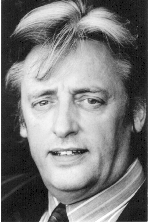
Michael Mansfield is head of one of the busiest chambers specialising in defence in criminal cases. He is regarded as a left-wing maverick by many members of the Bar - and a highly paid one at that. But his record in miscarriage of justice cases is impeccable - for he takes every opportunity to represent defendants in criminal trials and appeals where issues of civil liberty have arisen. Mike is the son of a station controller at Kings Cross who died before could finance Mike through University. Mike he worked his own way to a first in philosophy at Keele before taking up law. He says he was attracted to the profession from the moment that his mother successfully defended herself against a charge of illegal parking - when the police presented questionable evidence. His first big success was the Angry-Brigade trial in 1972, but his name became known to the man in the street during the miners' strike of 1984 when he moved to South Yorkshire to defend miners accused of riot and unlawful assembly. Amongst his famous cases are: Kevin Callan, the Tamil 2 Hunger Strike Appeal, Eddie Browning M50 case, the Cardiff 3, Judith Ward, Frank Critchlow, the Tottenham 3, the Birmingham 6, the Winchester 3, Prisoners at Risley and Strangeways, Students Poll Tax and the Bridgewater 4. Most recently he has been in the headlines whilst representing the family of Stephen Lawrence both in private prosecution for murder and at the Public Inquiry. Mike has also represented families at inquests, including the Marchioness Disaster. He chaired an Inquiry into the "Shoot to Kill" policy in the North of Ireland at Cullyhanna in 1991. One particular area of interest has been disclosure - or the lack of it - and the rules relating to this which have been developed in cases in which Michael Mansfield has appeared. These cases have included: Judith Ward, Osman, and the M25 murders. Mike is an executive Committee member of the Bar Association and a member of "Liberty"; he is also associated with "Justice". He is a member of many other groups that fight civil rights cases. He also appears frequently on TV and in 1991 presented a programme in which he proposed changes in the criminal justice system. .
 Press to return to the INDEX PAGE
Press to return to the INDEX PAGE